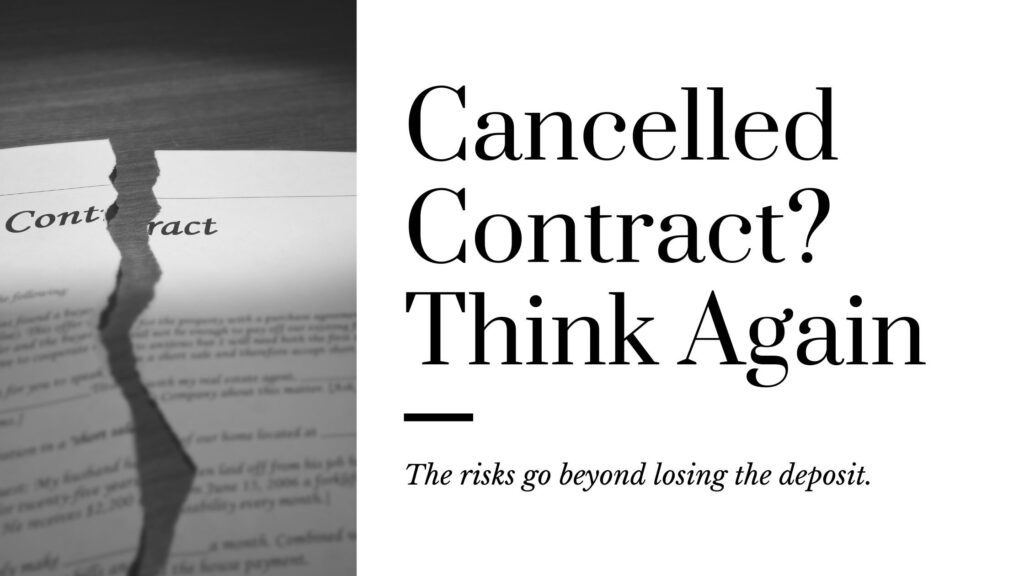Can a Buyer or Seller Cancel a Real Estate Contract Without Penalty?
Real estate transactions often begin with strong intentions from both buyers and sellers to see the process through to completion. However, unforeseen circumstances can necessitate the cancellation of the agreement. If a buyer or seller has a valid reason or contingency in place, cancellation may be possible without penalties. In this situation, the buyer’s earnest money deposit (EMD) held in escrow is typically refundable.
Understanding Potential Consequences of Cancellation
When contemplating the cancellation of a real estate contract without justification, it’s crucial to understand that the ramifications can extend far beyond simply losing the EMD. Many might assume that the worst outcome is only the forfeiture of their deposit. The reality, as explored below, is often much more complicated.
Real Estate Contract Dispute Resolution
According to Section 16 of the FAR/BAR contract, the buyer and seller are encouraged to resolve disputes amicably through mediation before escalating to legal avenues. Here are key aspects of this process:
10-Day Cooling-Off Period for EMD Disputes
- Cooling-Off Period: If a dispute arises regarding the EMD, both parties are required to attempt resolution independently during a 10-day period following conflicting demands for the deposit.
- This allows a chance to settle disputes without immediate legal action.
Mandatory Mediation Prior to Legal Action
- Should the cooling-off period be unproductive, the next step is mediation, where a neutral party aids in resolving the dispute. Mediation costs are typically shared equally by the buyer and seller.
Legal Remedies Available
- If disputes are not resolved through mediation, either party may pursue legal action.
- The prevailing party in such a case is entitled to recover costs associated with litigation, including reasonable attorney’s fees.
Buyer Default: What Are the Seller’s Options?
The Contracts define "Default" as a failure in fulfilling obligations, such as the timely payment of deposits. If a buyer defaults, the seller can choose one of the following actions:
Options for Sellers After Buyer Default
-
Retain the EMD as Liquidated Damages: The seller may opt to keep the earnest money deposit as full compensation for the default, releasing both parties from further obligations under the contract.
- File a Lawsuit: The seller may also pursue litigation to enforce their rights regarding the transaction, which can include claiming damages.
Seller Default: What Are the Buyer’s Options?
In the event that the seller fails to meet their obligations, the buyer has several options:
Options for Buyers After Seller Default
-
Recover EMD Without Waiving Claims: Buyers can receive their earnest money back while preserving the right to seek damages related to the seller’s default.
- Seek Damages or Specific Performance: Buyers may pursue compensation in court or request specific performance. This would legally compel the seller to fulfill their obligations under the contract.
The EMD and Its Broader Impact
It’s easy to assume that the EMD is the bulk of consequence when a real estate contract is breached. However, a clear understanding of potential legal actions and financial repercussions reveals that it’s not simply about retrieving the deposit.
Key Takeaway
Next time someone asks, “What’s the worst that can happen?” regarding the cancellation of a real estate contract, the answer is far from straightforward.
For those with concerns about contract cancellations, defaults, or any related legal matters, consulting with a knowledgeable real estate attorney can provide clarity and guidance.
Additional Resources
For more information on real estate contracts, visit Nolo and FindLaw for articles on legal processes surrounding real estate transactions.
Understanding the intricate details surrounding real estate contracts can safeguard both buyers’ and sellers’ interests and lead to more favorable outcomes in transactions.


